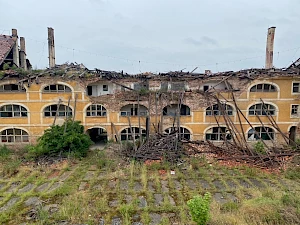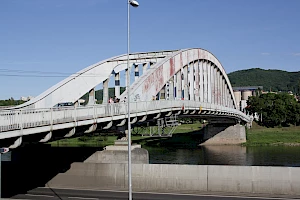Weekly review no. 35
31.05.2024
Czech Republic is ice hockey world champion

The whole of the Czech Republic is riding a wave of euphoria. The victory of the national ice hockey team at the World Championships at home has sent the whole country into a collective frenzy of joy. The public television recorded an incredible 76 percent of viewers for the final against Switzerland. Apart from public viewing in public squares, the streets were deserted.
The Czech Republic won a home World Cup for the first time in 39 years. But the country had to wait a long 14 years for its 13th title - if you count Czechoslovakia's six titles. The Czechs, led by superstar David Pastrňák, last won the World Cup in Germany in 2010. This means that the independent Czech Republic has now won more titles than Czechoslovakia. Ice hockey fans can look forward to a meeting between Germany and the Czech Republic at the 2025 World Cup in Denmark and Sweden. Both teams are already playing against each other in the group phase.
After their triumph, the ice hockey heroes were received by Prime Minister Petr Fiala, who awarded all the players the Karel Kramář Medal. It is the highest award that the Prime Minister can bestow. President Petr Pavel also received the ice hockey players. But there it was the other way round: the players dedicated a gold medal to him.
Garrison towns receive funding

From June, the Czech historical garrison towns of Terezín (Theresienstadt) and Josefov (Josefsstadt) can apply for money from the Czech regional ministry's new program for the preservation and development of garrison towns. A total of 1.2 billion crowns (48 million euros) are available for the next ten years. A further 500 million crowns (20 million euros) can be applied for from the respective districts. In addition, the Ministry of Culture has launched an emergency program for the years 2024 to 2028. This is intended to renovate buildings that are at risk of collapse or have already partially collapsed.
Terezín has also presented plans for the use of the buildings. The former Žižka barracks in Terezín, which is already in danger of collapsing, are to be converted into apartments. The former hospital is to continue to be used by social and health facilities.
The garrison towns built during the Austro-Hungarian era have been struggling with the decaying structure of their buildings for some time. In Terezín, many buildings have been empty since the Czech army withdrew in the early 2000s and are not being preserved. Some of them have been gradually renovated with the help of subsidies. There are also ongoing problems with their use. The number of buildings is simply too high for the relatively small population.
Border controls are extended
Germany is once again extending the temporary controls at the borders with the Czech Republic, Poland and Switzerland. This time, the measure will be extended by six months, specifically until December 15th. Germany justified this by wanting to continue to restrict illegal migration and people smuggling. The controls were introduced in October last year. Most recently, they were extended by three months until June 15th.
The interior ministers of the Czech Republic and Saxony, Vít Rakušan and Armin Schuster, met in mid-May. Both ministers agreed to increase monitoring of illegal migration across the border
Gas transit fees are abolished
Germany has abolished the levy for gas transport for its neighboring countries. The levy will be abolished at the borders from next year, said State Secretary for Economic Affairs Sven Giegold in Brussels. The levy has been in force in Germany since autumn 2022. But it also affected import companies in other countries that obtain gas via German pipelines. Austria and the Czech Republic had therefore accused the federal government of hindering gas transport from ports in the Netherlands, for example, as an alternative to deliveries from Russia. They spoke of distortion of competition. The EU Commission then put pressure on Germany.
Domestically, the gas storage levy will remain in place – and could now rise further for German consumers.
The Czech Minister for Industry and Trade, Jozef Síkela (independent), has welcomed Germany's decision to abolish transit fees for natural gas. It will contribute to strengthening energy security in Central Europe, Síkela wrote on Thursday on X.
Financing of the Beneš Bridge has been clarified

The renovation of the Beneš Bridge in Ústí nad Labem is getting closer. The Ústí District has received a promise of funding from the Integrated Regional Funding Program in the amount of 524 million crowns (almost 21 million euros). The district is contributing 92.5 million crowns (3.7 million euros) from its budget. This will ensure that the renovation of the aging bridge is financially secured. The construction of a temporary bridge for pedestrians and cyclists is currently laying the foundations for the work, which is due to begin next year. In June, the Ústí District will then present the concept of traffic measures for the complete closure of the bridge. The Beneš Bridge is one of two road bridges in the city of Ústí nad Labem. The steel bridge with the characteristic arch was built between 1934 and 1936 and named after the second president of Czechoslovakia.
The renovation has been overdue for some time, but has been postponed again and again. In the meantime, traffic on the bridge has been more restricted. For example, trolleybuses have not been allowed to pass each other on the bridge for years. The bridge has been closed to trucks for some time.
 The production of this newsletter is co-financed by tax revenue on the basis of the budget approved by the Saxon State Parliament.
The production of this newsletter is co-financed by tax revenue on the basis of the budget approved by the Saxon State Parliament.
